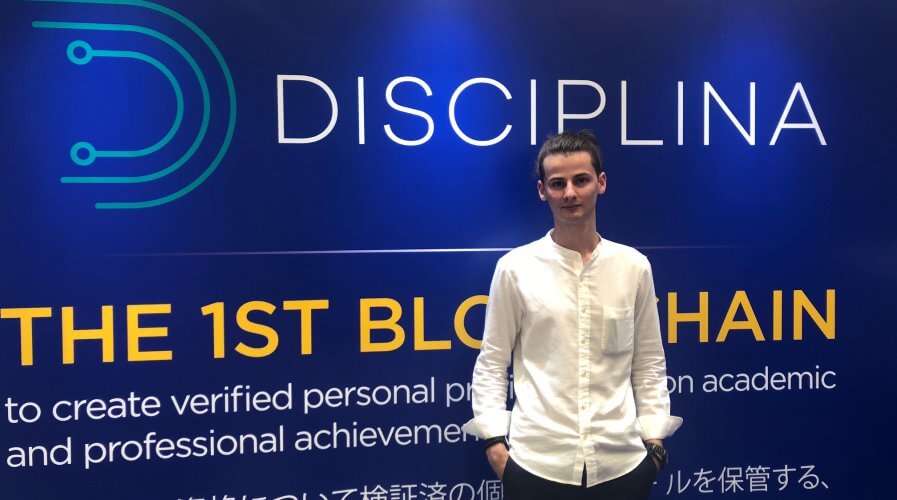
The question Ilya Nikiforiv, CEO of Disciplina asks companies is: Do you really know your employees? Source: Tech Wire Asia
Do you really know who you’re hiring? Let blockchain help you
EMPLOYERS have struggled for years with the question of how to know if a new potential employee is telling the truth about their credentials.
The problem of false resumes can have costly implications for businesses. And with the increasingly competitive job market, it is becoming more and more common for individuals to provide false information on their resume in order to try and secure a job.
And we’re not just talking about a mere enhancement of high-school grades from a C to a B grade. Job hunters are even going as far as whipping up fake employment histories, job references, and degrees.
There are many online services that facilitate this worrying trend. Such companies offer guidance on how to fill the gaps in your employment history, obtain fake references, and shape your resume so it is picked up by HR systems.
And for around US$199, you can even purchase a bachelor’s degree, complete with transcripts and letters of recommendation.
For companies, resume fraud is an incredibly costly problem. Not only this, but it is life-threatening.
Earlier this year, a man from Melbourne pleaded guilty to a number of charges related to practicing as a medical specialist when he wasn’t qualified to do so. In extreme cases, resume fraud can lead to death.
This is only one example of such cases. There have been numerous instances of fake pilots, veterinarians, and other health-care professionals.
However, fortunately, there seems to be a solution to this problem in the form of blockchain technology.
TechWireAsia spoke with Disciplina, a multifunctional blockchain for projects in the educational and recruiting spheres at Japan’s Blockchain Conference in Tokyo this week.
To aid both employees and employers, Disciplina has created a solution with their core technical team lead by the former lead developer of Cardano.
The aim of the company? To create a universal blockchain that will store information relating to a user’s personal achievement in a digital form, providing potential employers with the truth regarding their permanence and credibility.
Currently, the company is mainly focusing on building a platform for educational and professional records. By leveraging blockchain technology, the company aims to revolutionize the current educational record system which is fraught with problems such as proving the credibility of institutions, especially with so much of the population choosing to work across borders today.
With blockchain, Disciplina will create an ecosystem that encompasses academic institutions such as universities, academies, and online and offline organizations.
But as resume fraud is such as pertinent problem today, why hasn’t it been solved already? According to Ilya Nikiforiv, CEO of Disciplina;
“The problem why such a system does not exist right now is due to privacy. All the records are part of the privacy of a person which means it’s very complicated to work with this information without sharing it with third parties.
“That’s why we decided to design our own blockchain. It’s really the result of a lot of different issues, and it helps to connect the educational ecosystem together with records.
“Right now, people are spending a lot of time and money to educate themselves and attain records about themselves. As well as this, recruitment companies are spending a lot of time and money just to understand that these guys aren’t lying,
“We know the truth about ourselves and we even pay to get these records about ourselves. And after that, another company is paying money to understand that we are not lying. It’s not an effective system.
Blockchain solutions such as Disciplina aim to address this totally ineffective system of record keeping.
The company is set to totally disrupt the recruitment space by enabling companies to be connected with just the right candidate they’re looking for based on skills and qualifications stored on the blockchain.
“A company will be able to have a fully digitalized prestigious profile of the skills of the persons they are looking for. They can make a request to the blockchain, and find profiles of people based on their recruitment,” explained Nikiforov.
The third-party educational institutions will also greatly benefit from sharing these records.
“All these databases will profit from these requests. So, the recruitment company will pay money to make a search, and this money will go to the companies who have information about what they’re looking for. This means that it becomes more valuable for companies to have these records,” said Nikiforov.
Educational records can be monetized with blockchain technology, making it possible for universities to be paid for the records they hold. This means that there is an increasing interest for universities and schools to collect records about individuals. Which will, in turn, greatly benefit both employees and employers.
For universities, this offers a fantastic marketing opportunity. By offering students the opportunity to take part in additional courses and build new skills, they can add these records to the blockchain, creating a bigger opportunity to earn money.
On top of this, Nikiforov told Techwireasia how he expects new services will derive from the platform, such as analytics services.
This will give businesses and recruitment agencies a fantastic opportunity to take advantage of analytics, and to understand what makes a “perfect candidate”.
“For example, analytics companies can analyze information about how skills are transforming, and why a certain person may become successful. For example, they can come to understand why out of two people with a similar history of education, why one is super successful and the other not so.”
Such analytics can tell companies valuable information such as a skill that a successful candidate did during school which may have added to their ideal profile.
“With our system, you can analyze this big data and understand why some people come successful and what’s happening with their skills,” explains Nikiforov.
The true potential of blockchain technology in the educational and professional space cannot be ignored. The technology will enable employers to find the most suitably-skilled, reliable employees.
And for candidates, the application process will be more streamlined, as they will be connected to a job that best matches their skill set.
So, the question is, do you really know your employee?
READ MORE
- Ethical AI: The renewed importance of safeguarding data and customer privacy in Generative AI applications
- How Japan balances AI-driven opportunities with cybersecurity needs
- Deploying SASE: Benchmarking your approach
- Insurance everywhere all at once: the digital transformation of the APAC insurance industry
- Google parent Alphabet eyes HubSpot: A potential acquisition shaping the future of CRM






